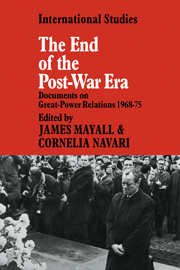Book contents
- Frontmatter
- Contents
- Preface
- Source Abbreviations
- Note on the texts of the documents
- Introduction
- I THE END OF THE COLD WAR
- II THE DIPLOMACY OF DETENTE
- III CHANGES IN THE WESTERN ALLIANCE
- A The North Atlantic Treaty Organization
- B The Eurogroup
- C The European Community
- IV THE WARSAW TREATY ORGANISATION
- V THE GREAT POWERS AND THE MIDDLE EAST WAR OF OCTOBER 1973
- VI THE CRISIS OF THE INTERNATIONAL ECONOMIC ORDER
A - The North Atlantic Treaty Organization
Published online by Cambridge University Press: 07 October 2011
- Frontmatter
- Contents
- Preface
- Source Abbreviations
- Note on the texts of the documents
- Introduction
- I THE END OF THE COLD WAR
- II THE DIPLOMACY OF DETENTE
- III CHANGES IN THE WESTERN ALLIANCE
- A The North Atlantic Treaty Organization
- B The Eurogroup
- C The European Community
- IV THE WARSAW TREATY ORGANISATION
- V THE GREAT POWERS AND THE MIDDLE EAST WAR OF OCTOBER 1973
- VI THE CRISIS OF THE INTERNATIONAL ECONOMIC ORDER
Summary
Communiqué of the NATO Council, Brussels, 16 November 1968
1. The North Atlantic Council met in Ministerial session in Brussels on 15 th and 16th November. The meeting was attended by Foreign, Defence and Finance Ministers. The Council had moved forward from mid-December its normal year-end meeting so that Ministers might discuss at an earlier date the serious situation following the armed intervention in Czechoslovakia and the occupation of that country by forces of the Soviet Union and four of its Warsaw Pact Allies.
2. Ministers reaffirmed the inviolability of the principle, which has been invoked on numerous occasions by every country, including the USSR, that all nations are independent and that consequently any intervention by one state in the affairs of another is unlawful.
They noted that this principle has been deliberately violated by the Soviet leaders with the backing of four of their allies. World opinion has been profoundly shocked by this armed intervention carried out against the wishes of the Government and people of Czechoslovakia. All the members of the Alliance have denounced this use of force which jeopardises peace and international order and strikes at the principles of the United Nations Charter. Like all other peoples, the people of Czechoslovakia must be free to shape their future without outside interference. Agreements concluded under the pressure of occupying forces can provide no justification for challenging this basic concept.
- Type
- Chapter
- Information
- The End of the Post-War EraDocuments on Great-Power Relations 1968-1975, pp. 345 - 381Publisher: Cambridge University PressPrint publication year: 1980



